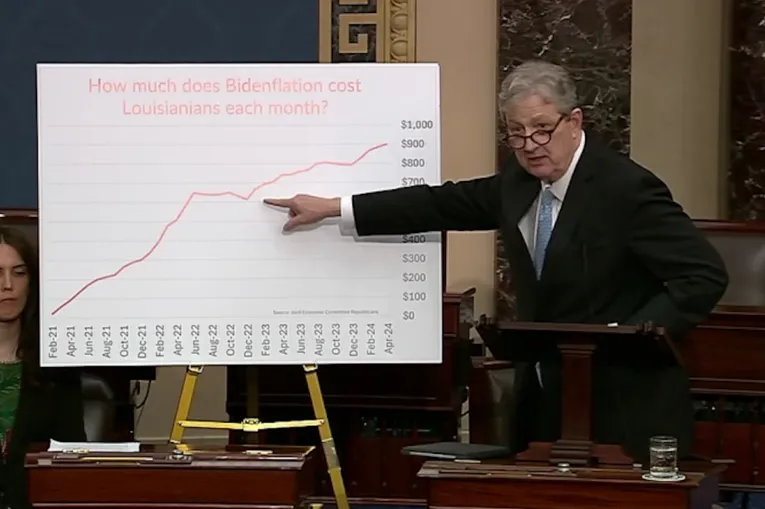Joe Biden’s energy policy is coming up empty with voters on the eve of the critical midterm elections. A new poll by TIPP finds that 63 percent of American consumers directly blame President Biden either “a great deal” or “some” for the increase in the national average of nearly $4 a gallon for gas at the pump.
With September’s overall year-over-year inflation at 8.2 percent, Americans want to replace the Biden administration’s policies that restrict energy independence and inhibit affordability.
The latest TIPP poll on energy independence of October 2022 measured the opinions of adults on Biden’s energy policy, as well as views on usage of different fossil fuel types for the future. The results indicate that Americans want to return to energy independence. (The poll was conducted via an online survey from a sample of 1,376 adults from October 5th to October 7th, 2022. The results have a credibility interval of +/- 2.8 percentage points.)
This should come as no surprise given that the price of gas is now roughly $1.50 a gallon higher than in January 2021. According to the U.S. Energy Information Administration (EIA), the national average gas price was $2.39 per gallon when Biden took office compared to $3.87 per gallon today.
These higher energy prices ricochet into higher prices for nearly everything we buy. Energy has gone up 19.8 percent, while gas increased by 18.2 percent over the 12 months ending in September. Groceries like cereal, eggs, and milk underwent increases of 17.7 percent, 30.5 percent, and 15.2 percent, respectively over the past year. A devastating impact on American consumers.
The major cause of inflation is the multi-trillions of dollars spent by Congress. But another contributor is Biden’s “America-last” energy policies. Within a week in office, the Administration introduced sweeping radical reform ranging from ceasing new oil and gas leasing on federal land and offshore waters, to blocking mining on American soil that is rich with metals like copper, nickel, platinum-group elements, and other rare earth minerals, to finally abandoning the Keystone XL pipeline.
Attempting to mitigate high gas prices this year, the Biden Administration has tragically depleted the Strategic Petroleum Reserve (SPR) from 640 million barrels to 450 million barrels, now reaching its lowest level in four decades. With the announcement of OPEC+ production cuts, Biden will exhaust even further the emergency reserve by announcing the sale of 15 million barrels for December, leaving the U.S. more vulnerable than ever to serious oil supply disruptions as winter approaches and as the Russian invasion of Ukraine continues.
Now the Biden Administration, in an unprecedented, reckless move, has tapped the SPR again – something that has only been used three times in emergency drawdowns during Operation Desert Storm in 1991, the aftermath of Hurricane Katrina in 2005, and during the war in Libya in 2011.
Instead of producing and pumping more energy here at home, the Biden Administration has poured billions of taxpayer dollars into “clean energy.” Ironically, these alternative energy sources require minerals for such initiatives. But domestic supplies of those minerals and metals are often limited by the same environmentalists who insist on “going green.” Cobalt, which is necessary for batteries, is mined by the hands of children as young as six in the Democratic Republic of Congo, and polysilicon -- used for solar panels – is supplied by ethnic minorities trapped in Xinjiang forced labor camps.
Despite the current Administration’s emphasis on prioritizing renewable energy, 72 percent of surveyed consumers believe that the U.S. will still depend on oil, while 74% believed the same for natural gas for the coming decade according to the latest TIPP survey.
And, dependent we are. The U.S. consumed around 19.9 million barrels of oil per day and around 84.9 billion cubic feet per day of natural gas in 2021. According to a TIPP survey last year, the majority of surveyed Americans, 70 percent to be exact, agreed that the U.S. should pursue a diverse energy portfolio to include both renewable energy and fossil fuels.
Yet, a common-sense bipartisan approach to include solar, wind, natural gas, nuclear, oil, and coal is out of reach for now. The White House has engaged with foreign adversaries and rogue regimes like Venezuela and Saudi Arabia to fill the fossil fuel gap. Embarrassingly, the Saudi government rejected Biden’s suggested appeal to delay cuts until after the midterms.
Americans want Biden to pursue policies that unleash American energy production, instead of relying on foreign adversaries and emptying the SPR as a short-term fix, especially as there are nearly 38.2 billion barrels of untapped natural gas and oil reserves at home, according to 2020 data from the EIA.
Three of four Americans in the TIPP survey agree that the United States should pursue energy independence even if it means relying on fossil fuels.
Americans also believe - correct in our opinion - that oil and natural gas will continue to be needed in the future.
If Democrats lose to a big red wave on November 8th, they will have to in part blame the dangerous and expensive move by Biden to declare war on America’s fossil fuels. America is increasingly reliant on the fuels of our adversaries. Time to switch course, Joe, and use ALL OF America’s bountiful energy supply.
Stephen Moore is a co-founder of the Committee to Unleash Prosperity and a senior fellow at the Heritage Foundation.
Steve Pociask is the President and CEO of The American Consumer Institute, a non-partisan, public policy think tank.
Please email editor-tippinsights@technometrica.com
Please share with anyone who would benefit from the tippinsights newsletter. Please direct them to the sign-up page at:
https://tippinsights.com/newsletter-sign-up/









